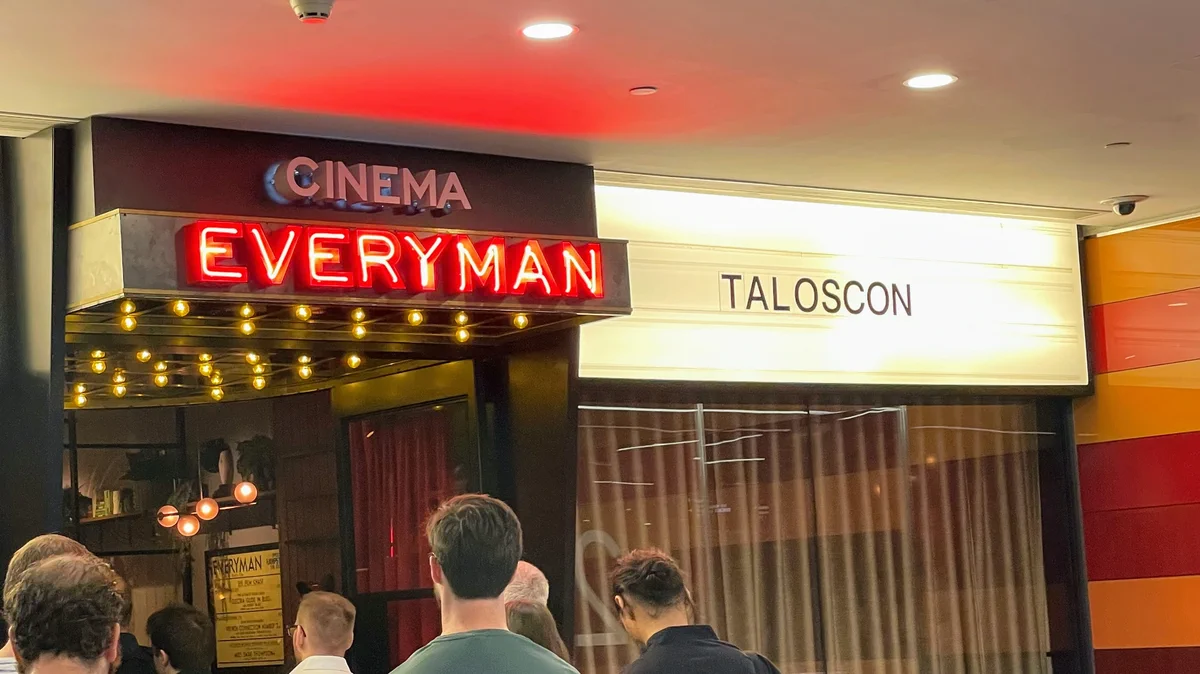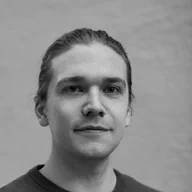SREDay London 2024 together with the day-0 TalosCon1 just finished, and I’m happy I got to attend!
I first heard about TalosCon during KubeCon + CloudNativeCon in Paris earlier this year, which also gave me the final push to actually try Talos.
It was great getting to hang out and connect with fellow Talos users and SRE enthusiasts. The intimate atmosphere at the Everyman Canary Wharf cinema made it easy to say hello to both the speakers and other attendees. I met a lot of great people (I still have much to learn!), and as to not forget anyone I’ll refrain from mentioning anyone except the presenters.
The following are my from-the-hip impressions and thoughts around the conferences a week after.
TalosCon#
The first on-prem TalosCon was held on September 18th. The day was packed with interesting talks across two tracks along with a workshop track. I of course couldn’t attend all of them, so apologies if you were one of the speakers and feel left out! You can find recordings of the TalosCon 2024 talks in this YouTube playlist.
The opening Keynote held by Steve Francis — CEO of Sidero Labs, reassured me that Talos is the way to go. They seem to have found a great way of monetising their product with Omni and further funding is secured. Security is high on the agenda, and v1.8.0 — that just released, offer AppArmor support, with SELinux support slated for the next minor release. Better disk management was also included in 1.8 which I’ve yet to play around with.
Following the inspiring keynote, Kubestronaut Pip Oomen from Redpill-Linpro held an informative history lesson on containerisation techniques titled OpenShift to Omni. For someone relatively new to the DevOps/SRE scene, it was interesting to see the path taken to where we are today with Kubernetes.
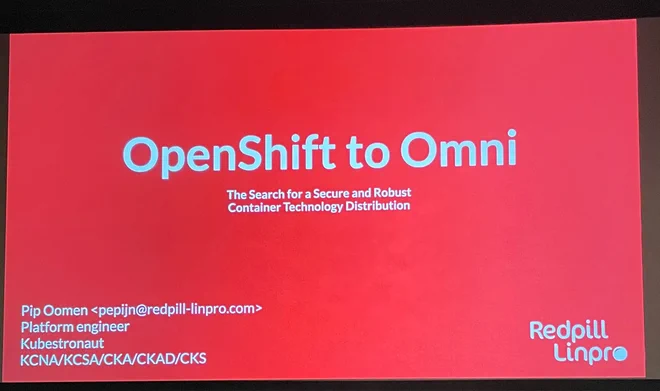
Next on the agenda I attended AT computing Michael Trip’s talk on Running KubeVirt on Talos Linux. The idea of running declaratively defined VMs inside an already declaratively defined Kubernetes cluster on top of an immutable (and therefore also declaratively defined) OS is an exciting idea. Next I’d just have to figure out PXE Boot and how to passthrough USB and PCIe-devices for a fully plug-and-play experience. Michael recommend to steer away from Multus for networking unless you really needed it, though a suggestion from the audience recommended he try Kube-OVN instead.
After lunch, I opted to try out the workshop on running Omni on-prem with Justin Garrison instead of listening to Tim Jones on How Sidero runs Omni. That unfortunately meant I also missed the talk on Managing Talos with CUElang by David Flanagan, the man behind Rawkode Academy. Both talks I’ll have try to watch when the recordings are available. The workshop unfortunately didn’t go exactly as planned, though we did get to chat with Justin, and he convinced me that Omni was worth checking out — at least in a professional setting.
With the workshop behind me, I attended Ænix founder Andrei Kvapil’s talk on Building a Bare Metal Platform with Talos, which further inspired me to try something similar. Parallel with Andrei’s talk, Neil Cresswell — Portainer CEO, presented Omni deployments made easy, on how to manage multiple clusters with Portainer. which — tongue-in-cheek, maybe should’ve been held before the Omni workshop.
The last talk I attended was titled From homelab to prod by Gerhard Lazu, meaning I missed out on 42on’s CTO Wout van Heeswijk talking about OpenStack on Talos Linux. I felt Gerhard’s talk was more about Dagger (which I also need to check out soon), than taking your homelab and running it in production, though it could be I simply misunderstood the premise of the talk.
The remaining talks I didn’t attend were two about edge deployments — Why Talos at the edge? held by Pau Campaña from Roche, and Bringing Kubernetes to the Edge: Lessons from the Frontlines presented by Fullstaq CEO Gerrit Tamboer, along with Vincent Behar talking about how Ubisoft is Running Game servers on Talos Linux, and Timo Ahokas’s Talos @NESC: From core compute to AI/ML in Nokia private & edge clouds.
SREDay London 2024#
With three tracks over two days SREDay(s) was a blast. There were a lot of great talks, though I unfortunately didn’t take notes, so I’ll allow myself to only summarise what I thought were the highlights of the conference and the general vibe.
The conference was kickstarted with a keynote by Ajuna Kyaruzi from Datadog on Automated Incident Management before Chris Cooney from Coralogix told The History of DevOps in 30 minutes. Alayshia Knighten ended with Pulumi’s solution to Unleashing Potential Screoss Teams: Infrastructure as Code, yet again affriming that I really have to try out Pulumi soon.
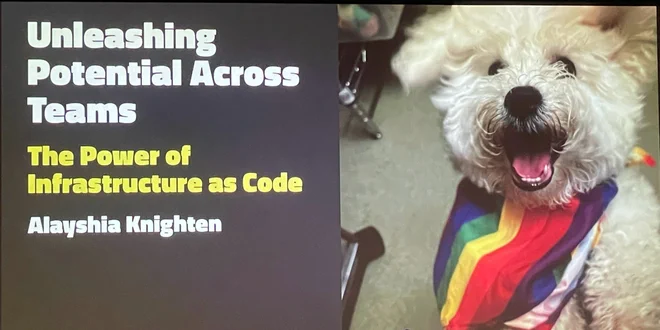
Many of the talks centered on culture creation in your organisation. These talks included examples on both to build a great developer experience, and sarcastic examples on how not to, for instance Cognizant' s Antonio Cobo Cuenca’s talk about From Hero to Zero: practical guide to destroy your best employees.
Leon Adato from Kentik began the infra-track with an insightful and fun lecture titled Alerts don’t suck, YOUR alerts suck. He made many great points about how you should only have alerts you care about. Do you have that alert you don’t really care about until the third time it shows up? Then maybe just have an alert for when the trigger occurs three times during a given interval. Sure, it might be more complex to configure, but once it’s set up you don’t have to touch it again and there will be fewer attention stealing messages.
Hrittik Roy presented Loft Labs’ approach to Virtual Kubernetes Clusters: A New Approach to Multi-tenancy, which for me seems like a great solution for perhaps a niche area. I’d still want to play around with it and see how it ticks though!
With lunch finished, Harel Safra from Riskified gave the talk When Infrastructure as Code Ends - Jump in and Create Some More which made a great job of writing your first OpenTofu/Terraform provider less intimidating.
Stenn International’s Aleksei Popov walked us through Architecture of a Fintech Startup: Tackling Growing Complexity at Scale before Thijs Feryn which introduced us to Caching the uncacheable in Varnish. I thought both talk were interesting, and I’ll definitely try to remember that Varnish exists when I have to think about caching at that scale.
After an evening socialising, the last day begain with Joyce Lin from Viam reaffirming the importance of infrastructure as code. Justin Garrison continued the keynotes with by restating the benefits of declarative configuration in his talk titled Declarative Linux with the Common Operating System Interface, selling the idea behind Talos — COSI, the Common Operating System Interface.
The last keynote was held by SREDay co-founder Miko Pawlikowski with a humours talk originally titled The state of SRE in 2024 filled with dinosaurs.
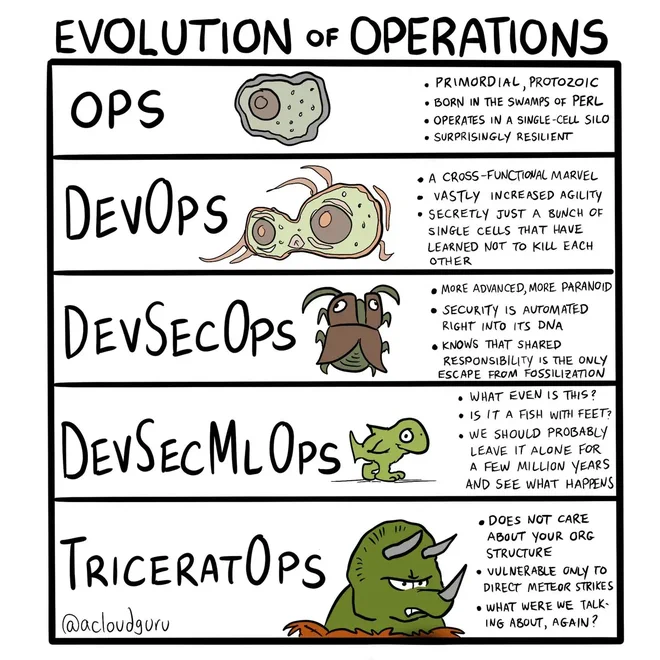
Data on Kubernetes ambassador Divine Odazie from Severalnines kicked off the tools-track with Cloud Native Technologies: The Building Blocks of Modern Database Software, talking about how cloud-native technologies like database operators and Container Storage Interfaces are revolutionising database software.
Marcos Diez from Modus Create delivered a very intriguing talk on replacing YAML with Terraform code titled Kubernetes, AWS, ALBs, Terraform and no Helm!. You can find an example of how he does that over at GitHub along with his presentation in this repository.
Resident meme connoisseur Oleg Fatkhiev at Citadel continued the track with Config files vs. flags: story of pain elaborating on the use of flags instead of config files for easier development.
Rawkode Academy founder David Flanagan treated us with an attempt to fix a broken Kubernetes cluster. From my recollection he had a selection of clusters he had broken himself some time ago, but had no idea which of the broken clusters he would attempt to fix. Unbeknownst to all of us, Cilium had released a broken version of cilium-cli a couple of days prior, which meant the cluster was broken in a completely new way! The whole kerfuffle made for an entertaining, interactive, and highly educational experience in debugging Kubernetes clusters. With some help from the audience, David managed to fix the cluster justa couple minutes over schedule.
Matteo Bianchi from Omnistrate held a humbling talk about Oops, I deployed too hard when he once accidentally took down a production service for a big customer and unknowingly took a long spicy lunch when it happened, coming back to a flurry of messages. He proselytised the importance of building a culture where it’s acceptable to make mistakes and learn from them, a belief I strongly hold myself.
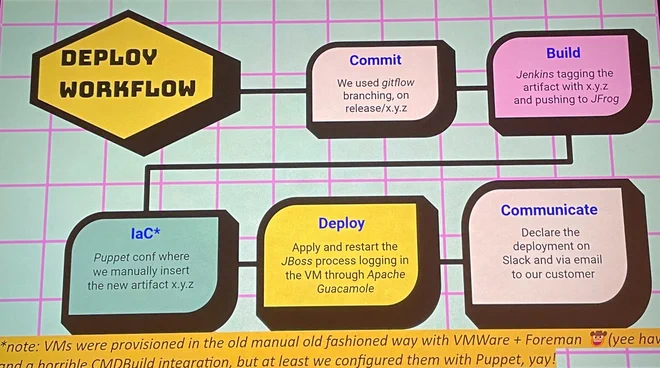
Following Matteo’s modest talk, Ondřej Babec and Jiří Novotný from Red Hat presented Debezium Server - New CDC runtime on the horizon!. Debezium is an open source tool for change data capture, listening to inserts, updates, and deletes that other apps commit to your database. This is one more of those tools I don’t need right now, but it’s good to know it exists for when I need it! You can check out the Debezium example they presented in this GitHub repository.
For the last two talk I changed to the observability track to listen to OVHCloud engineer Wilfried Roset. He elaborated on how observability can improve service quality down to the database level in his talk titled Improving the efficiency of more than 800 databases with observability: 4 years later.
Lastly, Ricardo Castro, SRE at FanDuel/Blip.pt reassured us that DevOps Is Not Dead. Not by a Long Shot.
DevOps is not a trend that has come and gone. It’s a cultural shift that has fundamentally changed how software is developed and deployed. While emerging practices like Platform Engineering may seem to be taking over, they are not meant to replace DevOps; instead, they are complementary to it.
Summary#
I had a great experience attending TalosCon and SREDay London and I would like to thank Edgeworks for letting me attend as part of their excellent focus on professional development (PS: We’re hiring!).
I’d also like to thank all the great people I met and discussed with, I hope I meet you again later! Please feel free to reach out if you’d like to stay in touch.
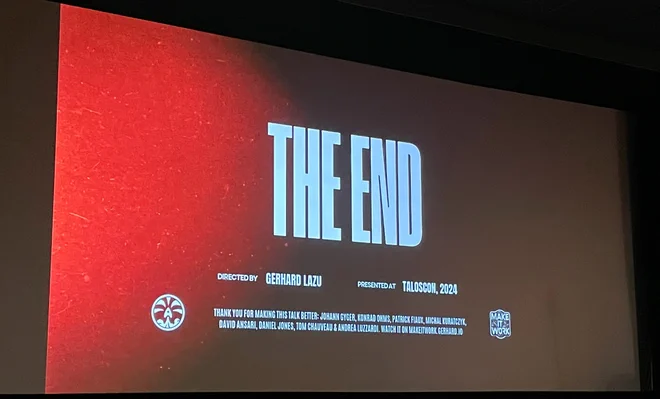
Sidero Labs already updated their webpages and apparently removed the schedule, but the Wayback Machine remembers. ↩︎

